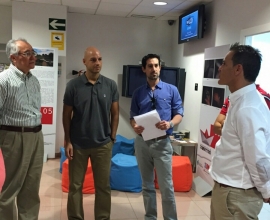Improving the reintegration of young offenders
Chilean delegation visits Spain and Ireland for an exchange of experiences regarding the reintegration of young offenders
Within the framework of the EUROsociAL II programme, financed by the European Union, the International Juvenile Justice Observatory (IJJO) is providing technical assistance to public institutions in Latin America.
In 2014 work began on a new line of work: ‘Support for the Modernization of Public Policy aimed at Adolescents in Conflict with the Law’, whose objective is to improve and modernize the juvenile justice systems in the region of Latin America. As part of this cooperation, between July 27 and 31 an exchange visit took place to Spain (Madrid) and Ireland (Dublin), whose objective has been to support the design and creation of a National Service for the Social Reintegration of Adolescents in Chile.
A delegation of Chilean public experts was observing European experiences and models, with the aim of supporting the design and creation of a National Service for the Social Reintegration of Adolescents in Chile. The delegation that made the visit was made up of Macarena Cortés, lawyer and head of the Department for the Social Reintegration of Adolescents of the Chilean Ministry of Justice; Claudia Espinoza, psychologist for the Chilean Ministry of Justice; and Mario Acuña, lawyer and head of the Department of Juvenile Justice of the National Service for Young People in Chile (SENAME, Servicio Nacional de Menores). The delegation received the technical support of the IJJO expert Dr. Carlos Tiffer. The visit to Spain (Madrid) and Ireland (Dublin) allowed those present to gain first-hand knowledge about institutional developments and organizations, as well as the programs and implementation of strategies for the social reintegration of adolescents in conflict with criminal law.
In Spain the delegation first visited the Madrid Agency for the Reeducation and Reintegration of Young Criminal Offenders (ARRMI, Agencia de la Comunidad de Madrid para la Reeducación y la Reinserción del Menor Infractor). Lead by the Director of the Centre, Dr. Regina Otaola, the delegation became acquainted with the functioning of public administration in this type of services.
Next, the delegation learnt about the El Lavadero Centre, where the implementation of open prison judicial measures is coordinated. It is dependent on the ARRMI and run by Fundación Diagrama. The foundation also organized for the delegation to visit Pi Gros, the center for reeducation of minors situated in and run by the Community of Valencia. The center is dependent on the Council for Equality and Inclusive Policies of the Valencian Generalitat.
Fundación Diagrama provided its knowledge and experience in the implementation of closed and open prison measures. The delegation also became familiar with community participation and social and vocational reintegration programs.
The delegation made its next stop in Ireland. The visit to Irish institutions consisted of meetings with the Irish Youth Justice Board, the Department of Children and Youth Affairs, the Children Court and the Office of the Director of Public Prosecutions. Representatives explained the role of,the programs and the inter-instutional coordination between said institutions for the proper functioning of and adherence to the public laws and policies relating to juvenile justice.
In the opinion of the Chilean delegation, this was an especially interesting and productive educational visit: “In the case of Ireland, gaining knowledge about the judicial system was of particular interest, especially the visit to various tribunals where they even let us sit in and watch. We could also see the treatment that the police and district attorneys give to young offenders. Finally, the visit to the closed center proved very enlightening, allowing us to become acquainted with their excellent standards of infrastructure.”
The main result of this study visit was getting to know two European systems (Spanish and Irish) in terms of their work on issues such as the reeducation and social reintegration of young people in conflict with criminal law. The supplies acquired on this five-day visit will go toward the development of an Operational Guide for the Creation of a Social Reintegration Service for Adolescents in Chile, which aims to act as a guide for the implementation of this service.
OIJJ

